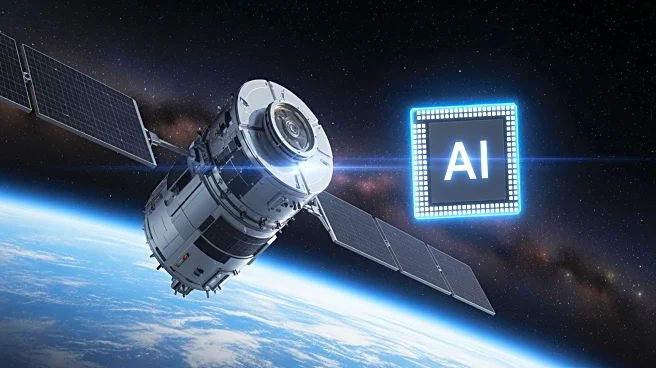What's Happening?
SpaceX successfully launched a Falcon 9 rocket from Cape Canaveral Space Force Station, carrying 18 payloads to mid-inclination orbit as part of its fourth Bandwagon rideshare mission. Among the payloads were
two significant technologies making their debut. Washington-based startup Starcloud launched the first iteration of an orbital AI data center equipped with a NVIDIA GPU to run AI models in space. This marks a precursor to Starcloud's commercial satellite, Starcloud-2, which aims to provide 24/7 data center access starting in 2026. Additionally, Vast introduced its demo hardware to validate technologies for its upcoming commercial space station, Haven-1, expected to launch next year. The mission also included satellites from South Korea, the UAE, and Turkey, contributing to various international projects.
Why It's Important?
The successful deployment of these technologies signifies a major advancement in space-based data processing and commercial space station development. Starcloud's AI data center could revolutionize how data is processed and utilized in space, offering continuous access and potentially enhancing global communications and data analytics. Vast's technology validation is crucial for the future of commercial space stations, which could expand human presence in space and foster new opportunities for research and industry. The inclusion of international satellites highlights the growing collaboration and competition in space technology, with countries like South Korea, the UAE, and Turkey advancing their capabilities and strategic interests.
What's Next?
Starcloud's next steps involve preparing for the launch of Starcloud-2, which will offer continuous data center access, potentially transforming space-based data operations. Vast will continue testing its technologies to ensure the successful launch of Haven-1, paving the way for commercial space station operations. The international satellites deployed will contribute to ongoing projects, such as South Korea's 425 Project and Turkey's IoT satellite constellation, enhancing global satellite networks and capabilities. These developments may prompt further investments and collaborations in space technology, as countries and companies seek to capitalize on emerging opportunities.
Beyond the Headlines
The launch underscores the increasing privatization and commercialization of space, with companies like SpaceX facilitating access to orbit for diverse payloads. This trend could lead to more competitive pricing and innovative solutions in satellite deployment and space exploration. The integration of AI in space operations may also raise ethical and security considerations, as the technology's capabilities expand. Additionally, the international participation in the mission reflects a shift towards a more collaborative and interconnected approach to space exploration, potentially influencing geopolitical dynamics.










